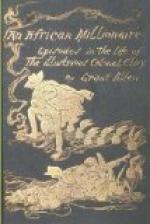For the next three days, at intervals, he returned to the charge. He bored me to death with his platinum and his rubies. He didn’t want a capitalist who would personally exploit the thing; he would prefer to do it all on his own account, giving the capitalist preference debentures of his bogus company, and a lien on the concession. I listened and smiled; I listened and yawned; I listened and was rude; I ceased to listen at all; but still he droned on with it. I fell asleep on the steamer one day, and woke up in ten minutes to hear him droning yet, “And the yield of platinum per ton was certified to be—” I forget how many pounds, or ounces, or pennyweights. These details of assays have ceased to interest me: like the man who “didn’t believe in ghosts,” I have seen too many of them.
The fresh-faced little curate and his wife, however, were quite different people. He was a cricketing Oxford man; she was a breezy Scotch lass, with a wholesome breath of the Highlands about her. I called her “White Heather.” Their name was Brabazon. Millionaires are so accustomed to being beset by harpies of every description, that when they come across a young couple who are simple and natural, they delight in the purely human relation. We picnicked and went excursions a great deal with the honeymooners. They were so frank in their young love, and so proof against chaff, that we all really liked them. But whenever I called the pretty girl “White Heather,” she looked so shocked, and cried: “Oh, Mr. Wentworth!” Still, we were the best of friends. The curate offered to row us in a boat on the lake one day, while the Scotch lassie assured us she could take an oar almost as well as he did. However, we did not accept their offer, as row-boats exert an unfavourable influence upon Amelia’s digestive organs.
“Nice young fellow, that man Brabazon,” Sir Charles said to me one day, as we lounged together along the quay; “never talks about advowsons or next presentations. Doesn’t seem to me to care two pins about promotion. Says he’s quite content in his country curacy; enough to live upon, and needs no more; and his wife has a little, a very little, money. I asked him about his poor to-day, on purpose to test him: these parsons are always trying to screw something out of one for their poor; men in my position know the truth of the saying that we have that class of the population always with us. Would you believe it, he says he hasn’t any poor at all in his parish! They’re all well-to-do farmers or else able-bodied labourers, and his one terror is that somebody will come and try to pauperise them. ’If a philanthropist were to give me fifty pounds to-day for use at Empingham,’ he said, ’I assure you, Sir Charles, I shouldn’t know what to do with it. I think I should buy new dresses for Jessie, who wants them about as much as anybody else in the village—that is to say, not at all.’ There’s a parson for you, Sey, my boy. Only wish we had one of his sort at Seldon.”




